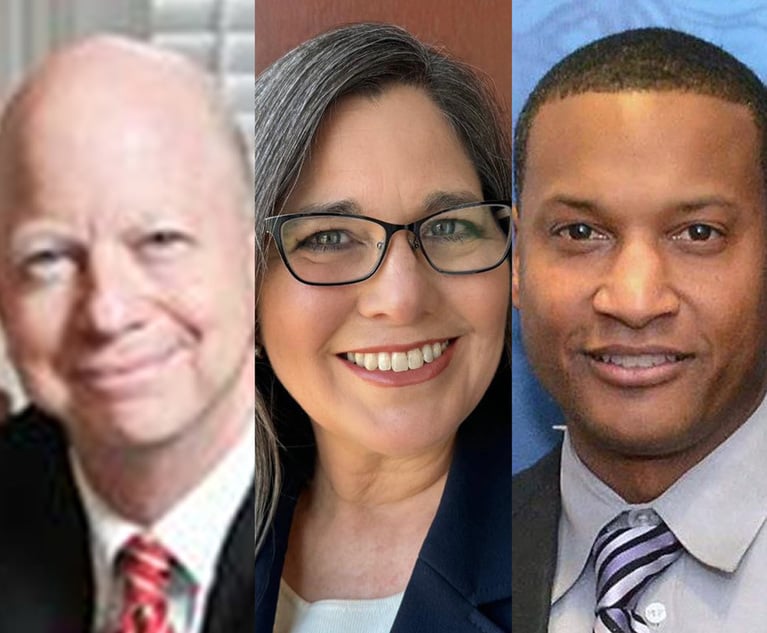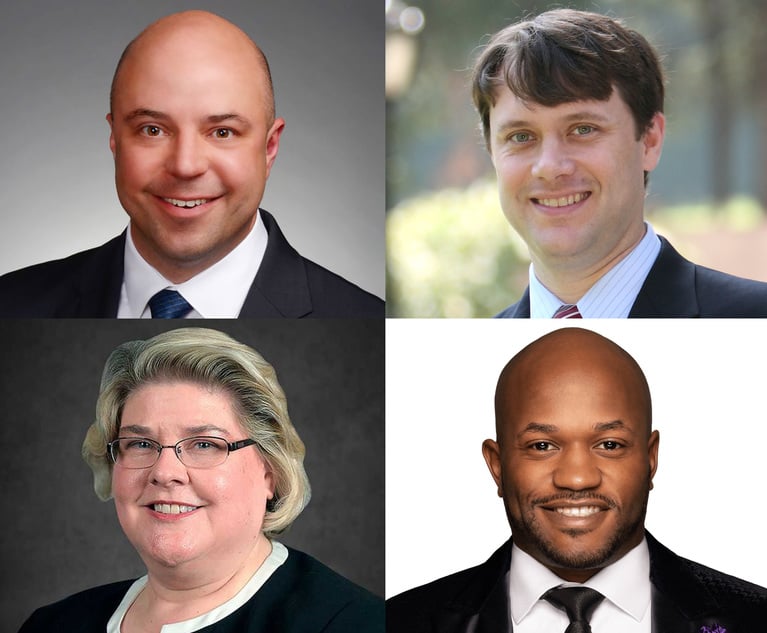 Judge Steve Goss, Georgia Court of Appeals. (Photo: John Disney/ ALM)
Judge Steve Goss, Georgia Court of Appeals. (Photo: John Disney/ ALM)'Pioneer' Accountability Court Judge Honored With Posthumous Hall of Fame Spot
"He was a pioneer who founded the first mental health court in Georgia. His leadership, kindness, and boundless service live on in the lives he touched," the National Association of Drug Court Professionals said.
May 29, 2020 at 06:36 PM
4 minute read
A beloved judge who launched a powerful treatment court movement, but later took his own life, was honored Friday at a virtual event described as the world's largest conference on addiction, mental health and justice reform.
Judge Stephen Goss served on the bench for more than 20 years, mostly in the South Georgia city of Albany, where he hosted visitors from around the state and the country, who came to watch and learn about the accountability court he started and presided over that helped people suffering from addictions and mental health challenges avoid prison and regain their lives.
Former Gov. Nathan Deal used the court Goss started as inspiration to encourage the formation of accountability courts that spread across the state and became a national model. Deal appointed Goss to the Georgia Court of Appeals in August 2018. But only a year after moving up to the intermediate appellate court, Goss was found dead of a gunshot wound in the woods behind his home. Police ruled the death a suicide.
"Today at #RISE20 Virtual, we posthumously inducted Judge Stephen Goss into the Treatment Court Hall of Fame," the National Association of Drug Court Professionals announced via Twitter. "He was a pioneer who founded the first mental health court in Georgia. His leadership, kindness, and boundless service live on in the lives he touched."
The tweet was shared by a former colleague who has since moved up to the high court, Georgia Supreme Justice Carla Wong McMillian. "I miss my friend and former colleague Judge Steve Goss but am glad to see that his legacy lives on," she said.
Goss grew up on his family's farm in Sale City, Mitchell County, Georgia, according to a biography published on the Court of Appeals website. He graduated in 1983 from the University of Georgia with a B.A., cum laude, majoring in political science. He graduated from the University of Georgia School of Law with a J.D., also cum laude, in 1986. Before becoming a judge, he was a partner in the Albany law firms of Watson, Spence, Lowe and Chambless, and Cannon, Meyer von Bremen and Goss.
In 2002, Goss founded the Dougherty Superior Court Mental Health/Substance Abuse treatment program—the first felony mental health court in Georgia and one of the early felony programs in the United States. He participated in a small work group that helped to develop the national essential elements guide for mental health court programs. Since 2006, the Dougherty Superior Court program has served as one of four national Learning Sites for mental health courts as designated by the United States Bureau of Justice Assistance and the Council of State Governments.
Goss served on state committees on mental health by appointment of former Gov. Sonny Perdue and Deal.
Georgia Supreme Court Chief Justice Harold Melton put the spotlight on mental health concerns—even inside his own ranks—in the annual State of the Judiciary address to a joint session of the Georgia General Assembly in the House Chamber in February.
"In addition to dealing with the behavioral health of people coming into our criminal justice system, I am also concerned about the mental health of our judges and lawyers," Melton said then. "Our own dirty secret is that the job of dealing with society's problems, in addition to our own, sometimes takes its toll. We are often not healthy ourselves."
Melton commended the State Bar of Georgia and law schools for reaching out with confidential services and counseling related to depression, stress, alcohol and drug abuse. "Mental health issues affect us all, either directly or indirectly," Melton said. He announced the Chief Justice's Commission on Professionalism will convene a suicide awareness program.
This content has been archived. It is available through our partners, LexisNexis® and Bloomberg Law.
To view this content, please continue to their sites.
Not a Lexis Subscriber?
Subscribe Now
Not a Bloomberg Law Subscriber?
Subscribe Now
NOT FOR REPRINT
© 2024 ALM Global, LLC, All Rights Reserved. Request academic re-use from www.copyright.com. All other uses, submit a request to [email protected]. For more information visit Asset & Logo Licensing.
You Might Like
View All


Who Got the Work: 16 Lawyers Appointed to BioLab Class Action Litigation
4 minute read
Trending Stories
- 1Getting Cameras in Federal Courts Will Take More than Logic
- 2Emerson Electric Opens Wallet to Reward New CLO for Fast Start
- 3Kirkland Hires Real Estate Finance Partners in New York
- 4Delaware Governor Names Magistrate Judge as Next Vice Chancellor
- 5Hagens Berman Accused of Withholding Share of $13M Award in Pharmaceutical Settlement
Who Got The Work
Michael G. Bongiorno, Andrew Scott Dulberg and Elizabeth E. Driscoll from Wilmer Cutler Pickering Hale and Dorr have stepped in to represent Symbotic Inc., an A.I.-enabled technology platform that focuses on increasing supply chain efficiency, and other defendants in a pending shareholder derivative lawsuit. The case, filed Oct. 2 in Massachusetts District Court by the Brown Law Firm on behalf of Stephen Austen, accuses certain officers and directors of misleading investors in regard to Symbotic's potential for margin growth by failing to disclose that the company was not equipped to timely deploy its systems or manage expenses through project delays. The case, assigned to U.S. District Judge Nathaniel M. Gorton, is 1:24-cv-12522, Austen v. Cohen et al.
Who Got The Work
Edmund Polubinski and Marie Killmond of Davis Polk & Wardwell have entered appearances for data platform software development company MongoDB and other defendants in a pending shareholder derivative lawsuit. The action, filed Oct. 7 in New York Southern District Court by the Brown Law Firm, accuses the company's directors and/or officers of falsely expressing confidence in the company’s restructuring of its sales incentive plan and downplaying the severity of decreases in its upfront commitments. The case is 1:24-cv-07594, Roy v. Ittycheria et al.
Who Got The Work
Amy O. Bruchs and Kurt F. Ellison of Michael Best & Friedrich have entered appearances for Epic Systems Corp. in a pending employment discrimination lawsuit. The suit was filed Sept. 7 in Wisconsin Western District Court by Levine Eisberner LLC and Siri & Glimstad on behalf of a project manager who claims that he was wrongfully terminated after applying for a religious exemption to the defendant's COVID-19 vaccine mandate. The case, assigned to U.S. Magistrate Judge Anita Marie Boor, is 3:24-cv-00630, Secker, Nathan v. Epic Systems Corporation.
Who Got The Work
David X. Sullivan, Thomas J. Finn and Gregory A. Hall from McCarter & English have entered appearances for Sunrun Installation Services in a pending civil rights lawsuit. The complaint was filed Sept. 4 in Connecticut District Court by attorney Robert M. Berke on behalf of former employee George Edward Steins, who was arrested and charged with employing an unregistered home improvement salesperson. The complaint alleges that had Sunrun informed the Connecticut Department of Consumer Protection that the plaintiff's employment had ended in 2017 and that he no longer held Sunrun's home improvement contractor license, he would not have been hit with charges, which were dismissed in May 2024. The case, assigned to U.S. District Judge Jeffrey A. Meyer, is 3:24-cv-01423, Steins v. Sunrun, Inc. et al.
Who Got The Work
Greenberg Traurig shareholder Joshua L. Raskin has entered an appearance for boohoo.com UK Ltd. in a pending patent infringement lawsuit. The suit, filed Sept. 3 in Texas Eastern District Court by Rozier Hardt McDonough on behalf of Alto Dynamics, asserts five patents related to an online shopping platform. The case, assigned to U.S. District Judge Rodney Gilstrap, is 2:24-cv-00719, Alto Dynamics, LLC v. boohoo.com UK Limited.
Featured Firms
Law Offices of Gary Martin Hays & Associates, P.C.
(470) 294-1674
Law Offices of Mark E. Salomone
(857) 444-6468
Smith & Hassler
(713) 739-1250






